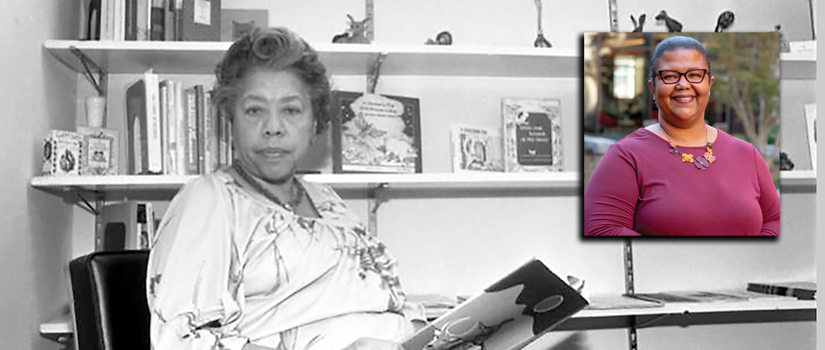Scanning Nicole Cooke’s list of accomplishments at the School of Information Science, it’s hard to believe she has only been at South Carolina for two years.
The Augusta Baker Chair in Childhood Literacy fully embraces “the dream job I never knew I wanted.” And she is already gaining university- wide recognition for her work, receiving UofSC’s social justice award in spring 2021.
Cooke recently discussed the new projects she’s shepherding at the iSchool.
One of your goals was to make the iSchool a destination graduate program for underrepresented students interested in diversity, equity, inclusion and social justice. What strides have been made to advance that goal?
We launched the Baker Scholars program to match funding for up to three master’s students who receive $5,000 Spectrum scholarships from the American Library Association. We have one scholar this year. He’ll be part of a special elite community that focuses on mentoring, job preparedness and things of that nature.
We’re also revising the Spectrum doctoral fellowship program. I received a grant from the Institute of Museum and Library Sciences, and I’m partnering with the ALA. The University of South Carolina will be the lead institution, and we’re going to work with partner schools to recruit eight to 10 minority candidates to enroll in Ph.D. programs.
The students will have their tuition paid and receive a stipend. Funding will be matched by their school, probably in the form of graduate assistantships. There will also be retreats where they’ll get to see their cohort in person, work with the advisory board and connect with mentors.
I was a Spectrum doctoral fellow in 2008 and to have the University of South Carolina be the center of this new project is really special. I’m really glad that I have the support here to make this happen.
This semester we also launched the equity, diversity and inclusion certificate program. We designed it as professional development for practicing librarians. It’s six classes, and then they’ll have a portfolio project. That will be a reflective capstone experience to help them figure out how they want to use the certificate in their practice.
You’ve also been taking steps to preserve Augusta Baker’s legacy and carry out her work.
We’re raising money for two projects. Augusta had a festschrift — it’s her retirement book from the New York Public Library. It contains original artwork, letters from all of the big publishers and really some of the biggest names in children’s books like Maurice Sendak and P.L. Travers, who wrote Mary Poppins. They wrote really, really personal letters, because that’s how much she supported them. The goal for this year, hopefully, is to get that book preserved because unfortunately it’s falling apart.
We also have a large collection of her books that she curated as a librarian and 11 or 12 boxes of her personal papers. We want to get them digitized for research purposes.
There used to be a review called the Interracial Books for Children Bulletin in the mid-’60s to the mid-’80s. Their goal was to highlight materials that positively portrayed Black children and children of color. Augusta worked with the bulletin at one point, and there has never been a successor.
I’m going to launch a newsletter called The Reservoir. It’s modeled after the bulletin, and it pays tribute to Augusta and her contemporaries who reviewed books and really challenged the children’s literature and publishing fields. Our goal is to start with students and publish in January and then June.
What do you have in the scholarship pipeline?
I have two contracts right now with the American Library Association. One of the books I’m going to write for them is Foundations of Social Justice. And then I am also doing the second edition of my textbook, which is Information Services to Diverse Populations.
I’ve also been working on a special double issue of the journal Libraries: Culture, History and Society. We’ll have 10 to 12 articles about Black women librarians — and these are not folks that have been written about. We wanted to tell some newer stories. We’re also including 20 blog entries that will be posted on the journal’s website.
How can librarians stay connected with your work?
I’m still doing the podcast with Publishers Weekly. The name will change for the season, and the goal is to feature more diversity content and more Baker content. And I’m continuing to write the column for Publishers Weekly.
This fall we’re launching two new lecture series. One is based in my critical cultural information studies class, and we’re calling that series #Critical Conversation In LIS. It will be a five or six-week series, usually on Thursdays at 4 p.m. The series is broadcast live, but it’s also being recorded and then posted on the Baker Chair website. Everything is free, and I announce the guests on my Twitter account @BakerChair.
We’re also partnering with Valerie Byrd Fort in the South Carolina Center for Community Literacy to launch AB Kids — Augusta Baker Kids. These lectures are specifically for children and their caregivers. They will be broadcast live on Tuesday mornings at 9 a.m.
